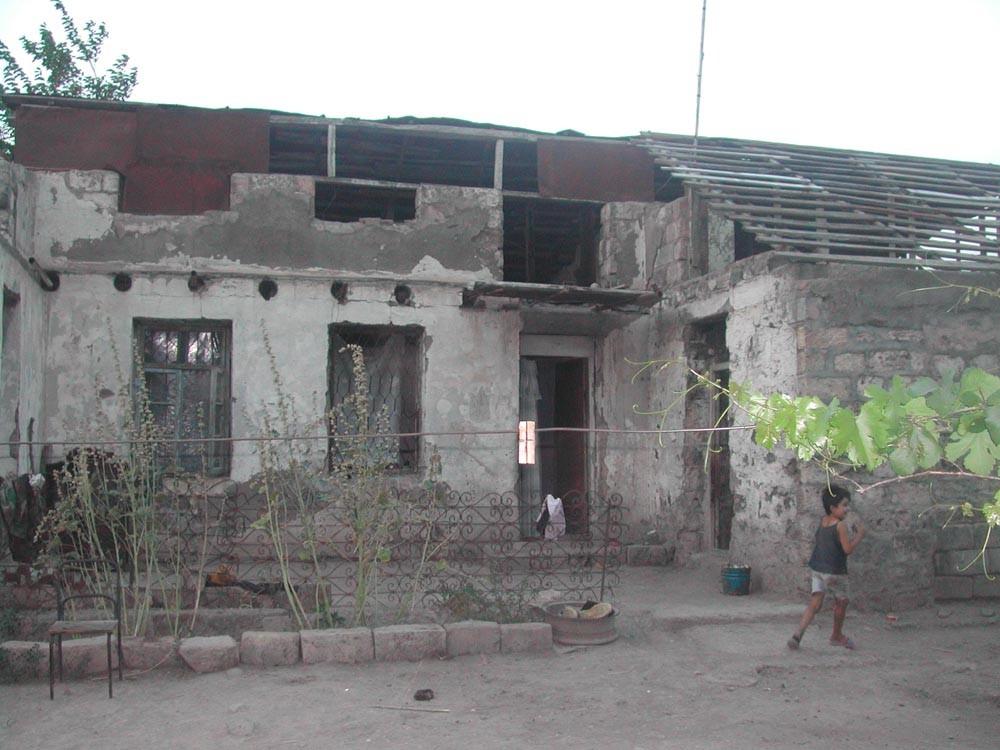
Illusions and Reality: Nine Years with No Electricity
“Hambaryan Pargev Washingtonovich,” was the answer we received from the father of many children from the village of Haykazyan to our question, “What is your name?” The villagers simply call Pargev Washingtonovich Hambaryan Pasha.
Only with the birth of their tenth child did the worries of this family begin to ease a bit. The state provided them with a one-time sum of $5,000. Three thousand dollars is deposited in a bank; the family can withdraw only the interest until their the youngest child turns eighteen.
Pasha moved from Artik to Karabakh with his wife and six children nine years ago. He was born in the village of Saratak in the Artik region, and he fought in the war with a military unit from the village.
 “We couldn't live in Artik – we always lacked food and fuel. We decided to settle here. This allowance was a great support. I bought livestock with all the money and some presents for the kids. I paid 200,000 drams (about $500) for each cow – they are excellent cows”, he says.
“We couldn't live in Artik – we always lacked food and fuel. We decided to settle here. This allowance was a great support. I bought livestock with all the money and some presents for the kids. I paid 200,000 drams (about $500) for each cow – they are excellent cows”, he says.
The family of twelve live in a dilapidated house. They, too, were promised that the house would be repaired or a new one would be built, but to no effect. Pasha says that if he had construction material he would build it himself, but there are no construction materials in these territories.
The village of Haykazyan has no electricity.
“In summer time it's bearable – the days are long, it gets dark late. But in winter it's very difficult without electricity,” Pasha said.
Pasha's neighbor Arusyak is the village nurse. Her husband serves in the army. They have three children. They receive 10,000 drams every three months for the children, along with his salary – 18,000 drams.
“My husband Smbat was a military man and was transferred here. So we came with him. It's very hard. Is it possible to live without electricity?” Arusyak asked.
Two of their children were born in Gyumri, and the third in Berdzor.
 |
 |
 |
“At first it was very, very difficult but there were 59 families here. Now only 9 households remain, every one left over the last three years. They couldn't get used to this life, they couldn't stand it without electricity. It was impossible to live, that's why they left. Every May we are told that by next December we'll have electricity, but we don't. Who will take an interest in us? There are so many children that haven't got their vaccinations. I haven't received any medicine for five months, and the vaccines are late as well. In Berdzor they say that they haven't received the medicine from Stepanakert. And I'm supposed to explain to the parents that the vaccines are to be brought to Berdzor from Stepanakert and then doctors will come and do the vaccinations. There are no buses now and going to Berdzor is a problem. I ask my husband to take us away from here as soon as possible, there is no electricity, nor transport and we drink water from wells,” said Nurse Arusyak.
“My child says, ‘Papa, when we went to Armenia they pinched the wall and the light came on, and there was a box with people in it,'” Pasha said and everybody laughed.
“People here are really pitiful; when I took my child to Armenia, we turned on the TV and he got scared. He was looking at the light with great interest turning it on and off and trying to understand what was it,” Arusyak added.
Sometimes some officials make it here. They come, ask questions, make promises and quickly leave. It's hard to listen to these people's stories. In all the requests they presented, the situation with electricity is the priority. People representing the state promise to solve the problem every year.
“I lived through the earthquake but this is, in fact, worse than the earthquake. During the earthquake we knew that something terrible had happened and we had to endure it. You walk ten kilometers and there is electricity, but there is none here. It's impossible to stay here. The kids come home from school at three o'clock. By the time they eat something and relax a bit it gets dark, they can't even do their homework. Can you imagine what it means not to have electricity in this century, and not for one day, or one month, but for nine years?” Arusyak asked.
The situation is the same in the neighboring villages. There were 37 families in the village of Hale three years ago; today only seven families remain. About 50 settlements in the Kashatagh region have not received electricity so far.
This proves one thing – the government has failed in implementing the resettlement program and continues to contribute to the desertion of those territories that have been repopulated.
Kashatagh-Yerevan
 Videos
Videos Photos
Photos




Write a comment